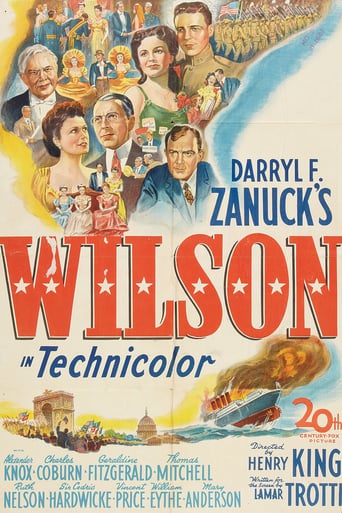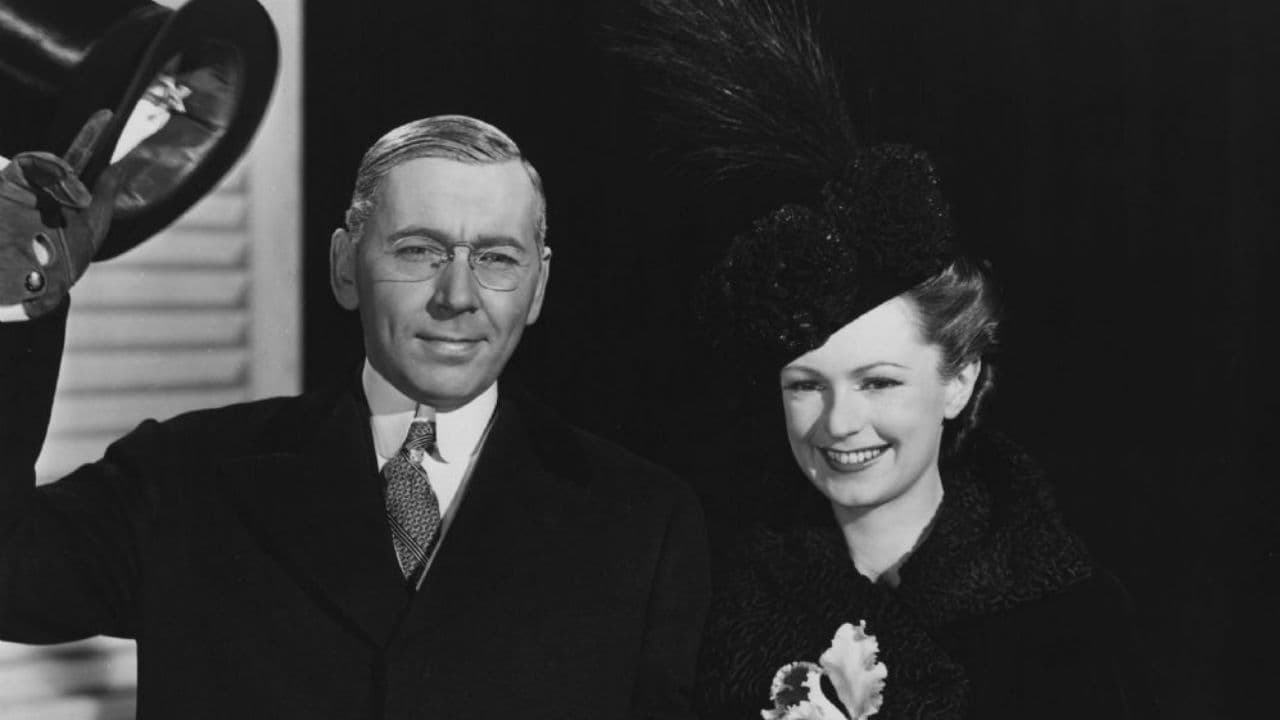IClaudius7
Wilson was undoubtedly a stiff autocrat but was so far ahead of his time by about 30 years with his 14 points for a vision of a League of Nations. Some inaccuracies were inevitable but overall, it deserved the 5 Oscars which were awarded.Aside from the fact that Wilson's own personality may have sunk his 14 point plan, it must have been personally galling that Warren G. Harding's administration was arguably the must corrupt the nation ever saw until Nixon. There is no doubt that he was far, far ahead of his time with the result of WWII which might have been averted with a League of Nations.
disinterested_spectator
Having finished watching "Wilson," I decided to compare it with other biopics of American presidents. I was surprised how few presidents have had movies made based on their lives. Abraham Lincoln gets the award for having the most, and he is the only president so featured prior to "Wilson" save Andrew Johnson. After "Wilson," there is a movie about Andrew Jackson in the early 1950s, and that is just about it until we get to the 1960s when American culture underwent radical change with the movies following suit. And needless to say, movies about presidents after Nixon and the Watergate scandal would never be the same.Regarding the pre-1960s biopics of American presidents, it is clear why they are so few in number. They are insufferable, being both boring and cloying. Notwithstanding all the money that was spent on the elaborate sets in making the movie about Woodrow Wilson, it is completely lacking in entertainment value. Nothing bad about Wilson is depicted. For example, we don't find out anything about what a racist he was. But those who produced this movie were not content simply to omit anything even slightly negative in his character. Like those who made movies about Lincoln during this period, they felt compelled to go way beyond mere omission and make the case that Wilson was no mere ordinary mortal, but rather was too good for this world, on a moral and spiritual plane high above his contemporaries, all but canonizing him for sainthood.
jacabiya
This is a film I've wanted to see for a long time since it was nominated for best picture and won a bunch of Oscars in 1944 (in what may be considered one of the weakest years for the Oscar with "Going My Way" winning best film (over the great "Double Indemnity") and Bing Crosby winning best actor). Worldwide as well this was not a great year, as I could only find "A Canterbury Tale", "Ivan the Terrible" and "Henry the V" as memorable films made that year (you could add "Laura" and a couple of Preston Sturges comedies. Blame it on the war). I was also interested in watching a color film made in 1944 in order to compare it with the great British color films made at that time. All in all, the cinematography was very good but the film was dull as hell, I suppose because Wilson was boring as hell and was interpreted by Alexander Knox who gave a performance boring as hell. I heard Henry Fonda was considered for the part and that would have certainly helped the quality of the film and its box office, which was terrible. Regarding historical accuracy, I leave that to others who have studied the matter.
pitcairn89
I agree with many of the comments posted here. I, too, was pleasantly surprised by this film. You always read what a box-office disaster the movie was, and you get the idea that it was a real turkey. On the contrary, I think it was a very well-made film. As many others have pointed out, it whitewashes some of Wilson's biography, and omits inconvenient truths about him, (such as some of his racial views and actions). It does point out his stubbornness in relation to the Treaty of Versailles and the League of Nations, though, and his reluctance to compromise on those things. So it isn't a total revisionist biography. It does outline the major events of his political career, and fairly accurately, I think. One thing that really strikes me on watching this film, is how well it captures the complexities of the American Presidency, and the hysteria that the public, and other politicians, often direct towards the president. I think many people, in any historical age, tend to think their generation is the first to experience certain kinds of events, such as war, depression, or political controversy. As we all know, these are timeless events, and though the particulars may change, the reactions to them don't change so much. As for politics, there are some wonderful scenes in the film of the Democratic Conventions of 1912 and 1916, that detail the serious issues, as well as the hoopla and occasional nonsense that has always marked those events. Marching bands, rural banjo players, pretty girls, etc., etc. And it also accurately details the hysterical attacks made against President Wilson- that he was weak, a waffler, a man out of his league, or a warmonger, even a traitor- comments that somehow bring to mind the outrageous things said about more recent presidents. As well as about everyone from Jefferson to Lincoln. It kind of puts it into perspective. People always say how uncivil our politics are now, which is true, but was it really different then?I'm also very impressed by Alexander Knox's performance, in which he really captures Wilson's character. Much as I love Bing Crosby, I think Knox should have won the Best Actor Oscar for that year. He is so convincing, and almost channels the President. Again, this IS a prettied-up picture of him, but I think it gets many of the essentials right. And, when compared to the paranoia in films like the Oliver Stone presidential biographies of Kennedy, Nixon, and Bush, I think this movie comes pretty close to the way it actually was. It is Movie History, but it seems to follow events fairly accurately. And it gives you a good feel about what it must have been like to be in the center of the storm. I think the film also recreates the period very well. The costumes seem accurate, the sets are realistic, the Technicolor photography is beautiful, and the contemporary music evokes the atmosphere of that time. The genuine newsreels add a lot of authenticity, too. I think the explanations for how the U.S. got into World War I are also pretty accurate, and detail what a moral struggle it was for Wilson to go to war. And, in the film, Wilson mentions the various conspiracy theories about the reasons for that war that have been in circulation since that time. Again, that reminds a person of the different conspiracy theories that swirl about our time, too.Anyway, I think this is a better film than it's given credit for. I think it is similar to the various mini-series made about Lincoln, Kennedy, and other presidents, in the TV age. It may not be complete history, but it's a good starting point for anyone interested in Wilson.Footnotes: character actor Dwight Frye, who is so beloved for his acting in "Dracula," "Frankenstein," and many other classic movies, was slated for the part of Newton D. Baker, Wilson's Secretary of War, in the film. As all Frye fans know, shortly before filming started, Frye tragically died of a heart attack, while riding on a bus. It's a shame, as the part might have turned his faltering career, and life, around.Also, in the scenes on board the train, just before Wilson has his stroke, you can see cars outside the window. It is supposed to be 1919 or 1920, but some of the cars look very contemporary- 1930s or 1940s cars. A goof, and very easy to see. But I don't think it really detracts from the movie in any serious way.


 AD
AD


